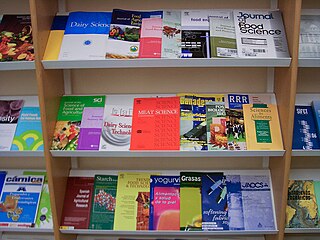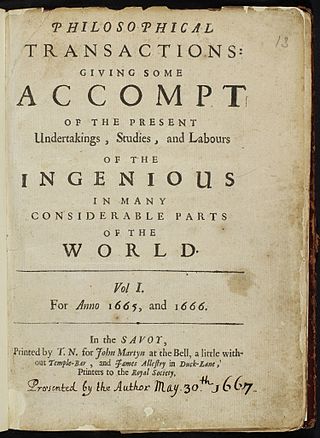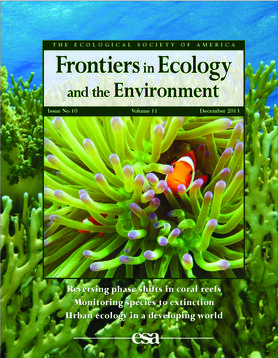
In academic publishing, a scientific journal is a periodical publication intended to further the progress of science, usually by sharing findings from research with readers. They are normally specialized based on discipline, with authors picking which one they send their manuscripts to.

An academic journal or scholarly journal is a periodical publication in which scholarship relating to a particular academic discipline is published. Academic journals serve as permanent and transparent forums for the presentation, scrutiny, and discussion of research. They nearly universally require peer review for research articles or other scrutiny from contemporaries competent and established in their respective fields.

Scientific literature comprises academic papers that report original empirical and theoretical work in the natural and social sciences. Within a field of research, relevant papers are often referred to as "the literature". Academic publishing is the process of contributing the results of one's research into the literature, which often requires a peer-review process.

The Royal Society, formally The Royal Society of London for Improving Natural Knowledge, is a learned society and the United Kingdom's national academy of sciences. The society fulfils a number of roles: promoting science and its benefits, recognising excellence in science, supporting outstanding science, providing scientific advice for policy, education and public engagement and fostering international and global co-operation. Founded on 28 November 1660, it was granted a royal charter by King Charles II as The Royal Society and is the oldest continuously existing scientific academy in the world.
Physical Review Letters (PRL), established in 1958, is a peer-reviewed, scientific journal that is published 52 times per year by the American Physical Society. As also confirmed by various measurement standards, which include the Journal Citation Reports impact factor and the journal h-index proposed by Google Scholar, many physicists and other scientists consider Physical Review Letters to be one of the most prestigious journals in the field of physics.
Proceedings of the Royal Society is the main research journal of the Royal Society. The journal began in 1831 and was split into two series in 1905:

George Francis Rayner Ellis, FRS, Hon. FRSSAf, is the emeritus distinguished professor of complex systems in the Department of Mathematics and Applied Mathematics at the University of Cape Town in South Africa. He co-authored The Large Scale Structure of Space-Time with University of Cambridge physicist Stephen Hawking, published in 1973, and is considered one of the world's leading theorists in cosmology. From 1989 to 1992 he served as president of the International Society on General Relativity and Gravitation. He is a past president of the International Society for Science and Religion. He is an A-rated researcher with the NRF.
The impact factor (IF) or journal impact factor (JIF) of an academic journal is a scientometric index calculated by Clarivate that reflects the yearly mean number of citations of articles published in the last two years in a given journal, as indexed by Clarivate's Web of Science.

Philosophical Transactions of the Royal Society is a scientific journal published by the Royal Society. In its earliest days, it was a private venture of the Royal Society's secretary. It was established in 1665, making it the first journal in the world exclusively devoted to science, and therefore also the world's longest-running scientific journal. It became an official society publication in 1752. The use of the word philosophical in the title refers to natural philosophy, which was the equivalent of what would now be generally called science.

Royal Society for Public Health (RSPH) is an independent, multi-disciplinary charity concerned with the improvement of the public's health.
Scientific writing is writing about science, with an implication that the writing is by scientists and for an audience that primarily includes peers—those with sufficient expertise to follow in detail. Scientific writing is a specialized form of technical writing, and a prominent genre of it involves reporting about scientific studies such as in articles for a scientific journal. Other scientific writing genres include writing literature-review articles, which summarize the existing state of a given aspect of a scientific field, and writing grant proposals, which are a common means of obtaining funding to support scientific research. Scientific writing is more likely to focus on the pure sciences compared to other aspects of technical communication that are more applied, although there is overlap. There is not one specific style for citations and references in scientific writing. Whether you are submitting a grant proposal, literature review articles, or submitting an article into a paper, the citation system that must be used will depend on the publication you plan to submit to.

Nature Chemical Biology is a monthly peer-reviewed scientific journal published by Nature Portfolio. It was established in June 2005 by founding Chief Editor Terry L. Sheppard as part of Nature Publishing Group. Sheppard was the Chief Editor of the journal 2004–2022. The current editor-in-chief is Russell Johnson.

Biology Letters is a peer-reviewed, biological, scientific journal published by the Royal Society. It focuses on the rapid publication of short high quality research articles, reviews and opinion pieces across the biological sciences. Biology Letters has an average turnaround time of twenty four days from submission to a first decision.

Denis Noble is a British physiologist and biologist who held the Burdon Sanderson Chair of Cardiovascular Physiology at the University of Oxford from 1984 to 2004 and was appointed Professor Emeritus and co-Director of Computational Physiology. He is one of the pioneers of systems biology and developed the first viable mathematical model of the working heart in 1960. Noble established The Third Way of Evolution (TWE) project with James A. Shapiro which predicts that the entire framework of the modern synthesis will be replaced.

The New Journal of Chemistry is a monthly peer-reviewed scientific journal publishing research and review articles on all aspects of chemistry. It is published by the Royal Society of Chemistry on behalf of the French National Centre for Scientific Research (CNRS). It was established as Nouveau Journal de Chimie in 1977, acquiring its current title in 1999. The current editors-in-chief is Jean-François Gérard. According to the Journal Citation Reports, the journal has a 2020 impact factor of 3.591.

Philosophical Transactions of the Royal Society B: Biological Sciences is a biweekly peer-reviewed scientific journal published by the Royal Society. The editor-in-chief is Richard Dixon (UNT).

Philosophical Transactions of the Royal Society A: Mathematical, Physical and Engineering Sciences is a fortnightly peer-reviewed scientific journal published by the Royal Society. It publishes original research and review content in a wide range of physical scientific disciplines. Articles can be accessed online a few months prior to the printed journal. All articles become freely accessible two years after their publication date. The current editor-in-chief is John Dainton.
An academic discipline or academic field is a subdivision of knowledge that is taught and researched at the college or university level. Disciplines are defined and recognized by the academic journals in which research is published, and the learned societies and academic departments or faculties within colleges and universities to which their practitioners belong. Academic disciplines are conventionally divided into the humanities, including language, art and cultural studies, and the scientific disciplines, such as physics, chemistry, and biology; the social sciences are sometimes considered a third category.

Frontiers in Ecology and the Environment is a peer-reviewed scientific journal issued ten times per year, and consists of peer-reviewed, synthetic review articles on all aspects of ecology, the environment, and related disciplines, as well as short, high-impact research communications of broad interdisciplinary appeal. Additional features include editorials, commentaries, a letters section, Life Lines, job ads, and special columns. It is published by Wiley-Blackwell on behalf of the Ecological Society of America (ESA). According to the Journal Citation Reports, the journal has a 2021 impact factor of 13.780, ranking it eleventh out of 279 journals in the category "Environmental Sciences" and fourth out of 174 journals in the category "Ecology".
Progress in Biophysics and Molecular Biology is a peer-reviewed scientific journal publishing review articles in the fields of biophysics and molecular biology. It was established in 1950 as Progress in Biophysics and Biophysical Chemistry, obtaining its current title in 1963.













